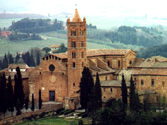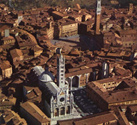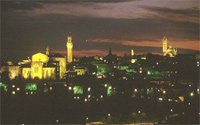
| According
to legend Siena was founded by Senio, the son of Remus one of the
two founders of Rome. The origin for the name of Siena, undoubtedly
one of the most be autiful cities in Italy and in the world, is still
a matter of research. Some attribute it to the Etruscan family of
the Saina, some to the Roman family of the Saenii. It is certain that
its development only took off in the Middle Ages, when it expanded
towards three nucleuses which later became known as the "tertiary":
the original city center, San Martino and Camollia. A Ghibelline city,
Siena often crossed swords with the Florentine Guelfs in epic and
cruel battles that forget the history of medieval Italy. One of the
most famous battles was Montaperti on 4 September 1260, when the Sienese
routed the Florentines.And these are the reason why "Siena opens
up its heart more than any other place", as the famous inscription
reads on the Porta Camollia |
 |
||||||
| Siena is also the Cathedral and the extraordinary panorama from the Facciatone; the Libreria Piccolomini and the prestigious Accademia Chigiana; the enormous Medicean fortress that on the inside, at the Enoteca Italiana, harbors the most precious wines of Siena, Tuscany and the peninsula; sweet-smelling Trattorias, sweet spices, the sounds of the artisans and spouting fountains; Fontebrande and the mystery of the Diana, a famous river underneath Siena; the alchemy geometry of the Piazza, suggestively neo-Gothic and cathartic. . | |||||||
|
|||||||
Palio and Contrade  |
|||||||
 |
The
Palio, probably the most famous “horserace” in the world,
is the very synthesis of the Sienese life, being the expression of
the people’s rebellion to all forms of oppression and irresistible
desire for freedom. The Palio has all the characteristic features
of open air representations and all the mystic values of religious
festivals, but, above all, it testifies of the verlasting spirit of
freedom of the town, particularly after the above mentioned fall of
the Republic. At that time, the old military companies became in fact
useless and were turned into peaceful organizations called “Contrade”,
devoted to the organization of public entertainments and traditional
celebrations, such as the Palio. The Contrade were legally established in 1725 by Violante of Bavaria, governess of the town, who granted them a particular jurisdiction over a well defined territory. They may possess estates and houses inside the town; they have their own church where the children are baptized, and by which is the hall where public meetings are held; moreover, in relatively recent years, clubs have been opened to provide amusement for adults and children. As a rule, one belongs to a Contrada by birth, but nowadays, when it is difficult to find homes within the historical town and every child comes into being in a hospital, one belongs to his Contrada even living elsewhere. At the head of each Contrada is a “Priore” but, during the Palio days, is appointed a captain, helped by two lieutenants, who surveys the development of all the formalities connected with the race. They make alliances and secret agreements with other Contrade for the benefit of their own Contrada, disposing of large sums of money granted by their people. The Palio takes place every year on July 2nd and on August 16th, even if its spirit is alive during all Year round the town. It is, however, deeply pervaded with a religious feeling. On July 2nd it is in honour of the Madonna di Provenzano, while on August 16th it is devoted to Vigin Mary, Protectress of the town, as since the very earliest times the Sienese have always had for Her a special veneration. |
||||||







